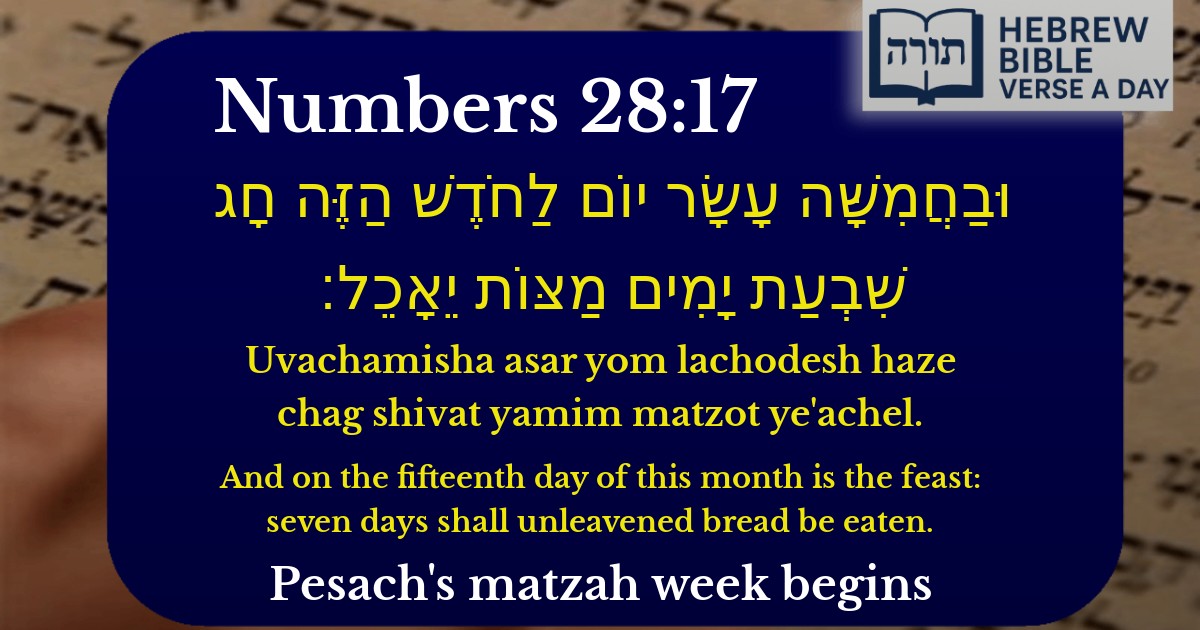Frequently Asked Questions
Q: What does the verse 'And on the fifteenth day of this month is the feast: seven days shall unleavened bread be eaten' mean?
A: This verse from Numbers 28:17 refers to the holiday of Passover (Pesach), which begins on the 15th day of the Hebrew month of Nissan. It commands us to observe a seven-day festival during which we eat matzah (unleavened bread) to remember how our ancestors left Egypt in haste, without time for their bread to rise (Exodus 12:39). The Talmud (Pesachim 99b) discusses the importance of eating matzah specifically during these days.
Q: Why is eating matzah for seven days important?
A: Eating matzah for seven days is a central mitzvah (commandment) of Passover to remember our ancestors' Exodus from Egypt. The Rambam (Maimonides) in Hilchot Chametz U'Matzah (6:1) explains that this practice helps us connect to our history and appreciate our freedom. Matzah is called 'the bread of affliction' (Deuteronomy 16:3) but also represents redemption, as our ancestors ate it when leaving slavery.
Q: What can we learn from this commandment about eating matzah for seven days?
A: We learn several lessons: 1) The importance of remembering our history and God's miracles (Rashi on Exodus 13:8). 2) Humility - just as matzah is flat and simple, we should approach life with humility. 3) The value of acting quickly when doing mitzvot - our ancestors left Egypt in haste, teaching us not to delay when doing what's right (Mechilta on Exodus 12:39).
Q: How does this commandment apply to Passover observance today?
A: Today, Orthodox Jews strictly observe this commandment by: 1) Removing all chametz (leavened products) from our homes before Passover. 2) Eating matzah instead of bread for seven days (eight days outside Israel). 3) Holding special seder meals on the first nights where we retell the Exodus story. The Shulchan Aruch (Orach Chaim 453-494) details all the laws of Passover observance that stem from this biblical commandment.
Q: Why does the Torah specify the 15th day of the month for Passover?
A: The 15th of Nissan is significant because it marks the night our ancestors left Egypt (Exodus 12:41-42). The Midrash (Shemot Rabbah 18:12) explains that this date was chosen by God as the moment of redemption. The full moon on the 15th (when months were determined by lunar cycles) symbolizes completeness and divine providence. The Talmud (Rosh Hashanah 2b-3a) discusses how the Sanhedrin would sanctify the new moon to determine when Nissan begins.


The Fifteenth of Nissan: The Festival of Matzot
The verse (Bamidbar 28:17) states: "וּבַחֲמִשָּׁה עָשָׂר יוֹם לַחֹדֶשׁ הַזֶּה חָג שִׁבְעַת יָמִים מַצּוֹת יֵאָכֵל" ("And on the fifteenth day of this month is the feast: seven days shall unleavened bread be eaten"). This establishes the mitzvah of observing Chag HaMatzot, the Festival of Unleavened Bread, beginning on the 15th of Nissan.
Rashi's Explanation
Rashi (on Shemot 12:15) clarifies that the term "חָג" (feast) refers to the first day of Pesach, which is a Yom Tov (a festival day with prohibited labor). The subsequent six days are "חול המועד" (Chol HaMoed), intermediate days with lesser restrictions. The obligation to eat matzah applies all seven days, though the Torah emphasizes it particularly on the first night (Shemot 12:18).
The Significance of Matzah
Rambam (Hilchot Chametz U'Matzah 6:1) explains that eating matzah commemorates the haste of the Exodus, as Bnei Yisrael left Egypt so quickly that their dough did not have time to rise (Shemot 12:39). The Talmud (Pesachim 115b) further teaches that matzah symbolizes both redemption and humility, as it is simple and unpretentious.
Seven Days of Matzah
The Midrash (Mechilta Bo 12) notes that the seven-day duration corresponds to the seven days of creation, symbolizing a complete spiritual renewal. Additionally, the Zohar (Emor 98a) connects the seven days to the seven divine attributes (Sefirot), representing a process of refining the soul during Pesach.
Halachic Details